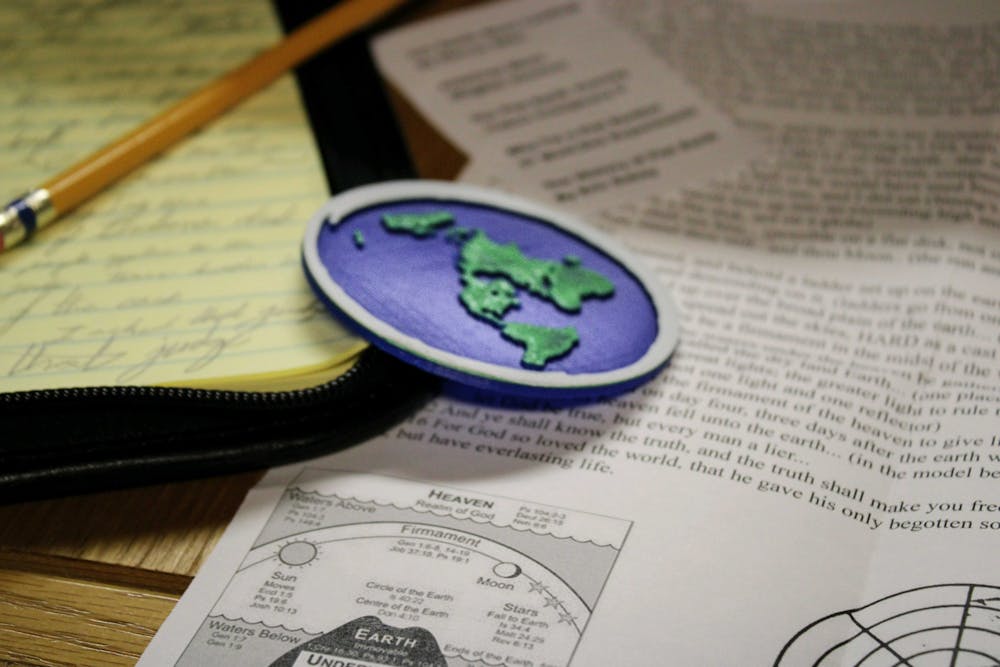The U.S. is locked in what could very well be considered a civil war of information. Every political faction seems to be locked in an echo chamber, and confidence in once-trusted institutions has been all but eroded.
What worries me more than conspiracy theories and misinformation is the knee-jerk reaction to censor those daring to talk about these topics. Misinformation is the result of a deeper problem: a lack of transparency and accountability.
I witnessed this information war amid a lively public discussion on campus. A small crowd gathered around an evangelical preacher who was giving the sermon decrying Dr. Anthony Fauci for his part in creating the “Chinese Virus” and producing a sinister vaccine. Occasionally, he responded to students’ comments and questions but disregarded hecklers.
Another public speaker was skeptic Peter Jarvio who stood by a poster board on an easel near the Metz Carillon. The poster questioned the legitimacy of the moon landing in bold, black letters which were flanked on all sides with pasted paragraphs of text and smaller graphs and photos. He was happy to explain every bit of it to me as I walked by.
Jarvio quickly transitioned to the explanation of why the moon landing was fake: the Earth is flat. It was a conspiracy theory double whammy that left my head spinning.
Jarvio is not too keen on the term “conspiracy theory.”
“These are conspiracy facts,” he said. “People conspire, that’s no secret.”
These examples are the extremes, of course. Conspiracy theories come in a wide variety. Some are more grounded in reality than others, such as theories about the U.S.’s history of meddling in foreign governments as opposed to lizard people controlling the world.
Some have even been proven to be true. A sitting president hiring burglars to infiltrate the office of his political rivals was considered a conspiracy theory until it made national headlines.
The easy thing to do is laugh off theorists like Peter Jarvio and the park-bench prophet. What is difficult is to take an idea seriously without accepting it as gospel. Understanding what misinformation and conspiracies are without either dismissing them entirely or believing them dogmatically is a skill everyone ought to have. An open yet strong mind is an indispensable virtue for people in the business of free speech.
Not even a decade ago, Edward Snowden revealed the extent of the National Security Agency’s surveillance powers being used against the American public in 2013. More recently, Forbes reported on Oct. 4 the federal government has secretly ordered Google and other search engines to track anyone who searches for certain keywords.
Conspiracy theories almost always emerge when powerful institutions engage in activities without public knowledge or consent. Example after example of government secrecy and corporate corruption is bound to leave many people fearful and paranoid, making them turn to those “alternative facts” as a great legal mind once called them.
Most of the people behind misinformation simply don’t know what is going on, and so they resort to guesswork. What is a conspiracy theory if not a big, elaborate guess? They are not usually educated guesses either.
However, censorship is not the answer. A tightened clench on the flow of information will backfire and make misinformation peddlers dig in deeper because they see active censorship as no different than cover-ups and sabotage. We must redirect the focus onto the powerful individuals and institutions of the world and demand greater access to information and real consequences for their actions.
If for-profit corporations and government agencies were much more transparent, and if there were better mechanisms for accountability on their part, there is no doubt in my mind that much of the misinformation and conspiracy theory world would collapse under their own weight.
Let the bad information defeat itself in the open marketplace of ideas. Factual information can stand the test of time. Truth does not need extra protection.
Eric Reingardt (he/him) is a freshman studying pre-law at the O’Neill School. He is a freelance writer with a profile on Substack.






